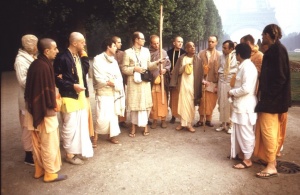CC Adi 4.155: Difference between revisions
m (1 revision(s)) |
(Vanibot #0054 edit - transform synonyms into clickable links, which search similar occurrences) |
||
| (One intermediate revision by one other user not shown) | |||
| Line 1: | Line 1: | ||
{{ | [[Category:Sri Caitanya-caritamrta - Adi-lila Chapter 04|C155]] | ||
<div style="float:left">'''[[Sri Caitanya-caritamrta|Śrī Caitanya-caritāmṛta]] - [[CC Adi|Ādi-līlā]] - [[CC Adi 4|Chapter 4: The Confidential Reasons for the Appearance of Śrī Caitanya Mahāprabhu]]'''</div> | |||
<div style="float:right">[[File:Go-previous.png|link=CC Adi 4.154|Ādi-līlā 4.154]] '''[[CC Adi 4.154|Ādi-līlā 4.154]] - [[CC Adi 4.156|Ādi-līlā 4.156]]''' [[File:Go-next.png|link=CC Adi 4.156|Ādi-līlā 4.156]]</div> | |||
{{CompareVersions|CC|Adi 4.155|CC 1975|CC 1996}} | |||
{{RandomImage}} | |||
==== TEXT 155 ==== | ==== TEXT 155 ==== | ||
<div | <div class="verse"> | ||
akṣaṇvatāṁ phalam idaṁ na paraṁ vidāmaḥ | :akṣaṇvatāṁ phalam idaṁ na paraṁ vidāmaḥ | ||
sakhyaḥ paśūn anuviveśayator vayasyaiḥ | :sakhyaḥ paśūn anuviveśayator vayasyaiḥ | ||
vaktraṁ vrajeśa-sutayor anuveṇu-juṣṭaṁ | :vaktraṁ vrajeśa-sutayor anuveṇu-juṣṭaṁ | ||
yair vā nipītam anurakta-kaṭākṣa-mokṣam | :yair vā nipītam anurakta-kaṭākṣa-mokṣam | ||
</div> | </div> | ||
| Line 14: | Line 18: | ||
==== SYNONYMS ==== | ==== SYNONYMS ==== | ||
<div | <div class="synonyms"> | ||
''[//vanipedia.org/wiki/Special:VaniSearch?s=akṣaṇvatām&tab=syno_o&ds=1 akṣaṇvatām]'' — of those who have eyes; ''[//vanipedia.org/wiki/Special:VaniSearch?s=phalam&tab=syno_o&ds=1 phalam]'' — the fruit; ''[//vanipedia.org/wiki/Special:VaniSearch?s=idam&tab=syno_o&ds=1 idam]'' — this; ''[//vanipedia.org/wiki/Special:VaniSearch?s=na&tab=syno_o&ds=1 na]'' — not; ''[//vanipedia.org/wiki/Special:VaniSearch?s=param&tab=syno_o&ds=1 param]'' — other; ''[//vanipedia.org/wiki/Special:VaniSearch?s=vidāmaḥ&tab=syno_o&ds=1 vidāmaḥ]'' — we know; ''[//vanipedia.org/wiki/Special:VaniSearch?s=sakhyaḥ&tab=syno_o&ds=1 sakhyaḥ]'' — O friends; ''[//vanipedia.org/wiki/Special:VaniSearch?s=paśūn&tab=syno_o&ds=1 paśūn]'' — the cows; ''[//vanipedia.org/wiki/Special:VaniSearch?s=anuviveśayatoḥ&tab=syno_o&ds=1 anuviveśayatoḥ]'' — causing to enter one forest from another; ''[//vanipedia.org/wiki/Special:VaniSearch?s=vayasyaiḥ&tab=syno_o&ds=1 vayasyaiḥ]'' — with Their friends of the same age; ''[//vanipedia.org/wiki/Special:VaniSearch?s=vaktram&tab=syno_o&ds=1 vaktram]'' — the faces; ''[//vanipedia.org/wiki/Special:VaniSearch?s=vraja&tab=syno_o&ds=1 vraja]-[//vanipedia.org/wiki/Special:VaniSearch?s=īśa&tab=syno_o&ds=1 īśa]'' — of Mahārāja Nanda; ''[//vanipedia.org/wiki/Special:VaniSearch?s=sutayoḥ&tab=syno_o&ds=1 sutayoḥ]'' — of the two sons; ''[//vanipedia.org/wiki/Special:VaniSearch?s=anuveṇu&tab=syno_o&ds=1 anuveṇu]-[//vanipedia.org/wiki/Special:VaniSearch?s=juṣṭam&tab=syno_o&ds=1 juṣṭam]'' — possessed of flutes; ''[//vanipedia.org/wiki/Special:VaniSearch?s=yaiḥ&tab=syno_o&ds=1 yaiḥ]'' — by which; ''[//vanipedia.org/wiki/Special:VaniSearch?s=vā&tab=syno_o&ds=1 vā]'' — or; ''[//vanipedia.org/wiki/Special:VaniSearch?s=nipītam&tab=syno_o&ds=1 nipītam]'' — imbibed; ''[//vanipedia.org/wiki/Special:VaniSearch?s=anurakta&tab=syno_o&ds=1 anurakta]'' — loving; ''[//vanipedia.org/wiki/Special:VaniSearch?s=kaṭa&tab=syno_o&ds=1 kaṭa]-[//vanipedia.org/wiki/Special:VaniSearch?s=akṣa&tab=syno_o&ds=1 akṣa]'' — glances; ''[//vanipedia.org/wiki/Special:VaniSearch?s=mokṣam&tab=syno_o&ds=1 mokṣam]'' — giving off. | |||
</div> | </div> | ||
| Line 21: | Line 25: | ||
==== TRANSLATION ==== | ==== TRANSLATION ==== | ||
<div | <div class="translation"> | ||
[The gopīs said:] | [The gopīs said:] "O friends, those eyes that see the beautiful faces of the sons of Mahārāja Nanda are certainly fortunate. As these two sons enter the forest, surrounded by Their friends, driving the cows before Them, They hold Their flutes to Their mouths and glance lovingly upon the residents of Vṛndāvana. For those who have eyes, we think there is no greater object of vision." | ||
</div> | </div> | ||
| Line 28: | Line 32: | ||
==== PURPORT ==== | ==== PURPORT ==== | ||
<div | <div class="purport"> | ||
Like the gopīs, one can see Kṛṣṇa continuously if one is fortunate enough. In the Brahma-saṁhitā it is said that sages whose eyes have been smeared with the ointment of pure love can see the form of Śyāmasundara (Kṛṣṇa) continuously in the centers of their hearts. This text from Śrīmad-Bhāgavatam ([[SB 10.21.7]]) was sung by the gopīs on the advent of the śarat season. | Like the ''gopīs'', one can see Kṛṣṇa continuously if one is fortunate enough. In the ''Brahma-saṁhitā'' it is said that sages whose eyes have been smeared with the ointment of pure love can see the form of Śyāmasundara (Kṛṣṇa) continuously in the centers of their hearts. This text from ''Śrīmad-Bhāgavatam'' ([[SB 10.21.7]]) was sung by the ''gopīs'' on the advent of the ''śarat'' season. | ||
</div> | </div> | ||
__NOTOC__ | |||
<div style="float:right; clear:both;">[[File:Go-previous.png|link=CC Adi 4.154|Ādi-līlā 4.154]] '''[[CC Adi 4.154|Ādi-līlā 4.154]] - [[CC Adi 4.156|Ādi-līlā 4.156]]''' [[File:Go-next.png|link=CC Adi 4.156|Ādi-līlā 4.156]]</div> | |||
__NOTOC__ | |||
__NOEDITSECTION__ | |||
Latest revision as of 18:55, 19 February 2024

A.C. Bhaktivedanta Swami Prabhupada
TEXT 155
- akṣaṇvatāṁ phalam idaṁ na paraṁ vidāmaḥ
- sakhyaḥ paśūn anuviveśayator vayasyaiḥ
- vaktraṁ vrajeśa-sutayor anuveṇu-juṣṭaṁ
- yair vā nipītam anurakta-kaṭākṣa-mokṣam
SYNONYMS
akṣaṇvatām — of those who have eyes; phalam — the fruit; idam — this; na — not; param — other; vidāmaḥ — we know; sakhyaḥ — O friends; paśūn — the cows; anuviveśayatoḥ — causing to enter one forest from another; vayasyaiḥ — with Their friends of the same age; vaktram — the faces; vraja-īśa — of Mahārāja Nanda; sutayoḥ — of the two sons; anuveṇu-juṣṭam — possessed of flutes; yaiḥ — by which; vā — or; nipītam — imbibed; anurakta — loving; kaṭa-akṣa — glances; mokṣam — giving off.
TRANSLATION
[The gopīs said:] "O friends, those eyes that see the beautiful faces of the sons of Mahārāja Nanda are certainly fortunate. As these two sons enter the forest, surrounded by Their friends, driving the cows before Them, They hold Their flutes to Their mouths and glance lovingly upon the residents of Vṛndāvana. For those who have eyes, we think there is no greater object of vision."
PURPORT
Like the gopīs, one can see Kṛṣṇa continuously if one is fortunate enough. In the Brahma-saṁhitā it is said that sages whose eyes have been smeared with the ointment of pure love can see the form of Śyāmasundara (Kṛṣṇa) continuously in the centers of their hearts. This text from Śrīmad-Bhāgavatam (SB 10.21.7) was sung by the gopīs on the advent of the śarat season.